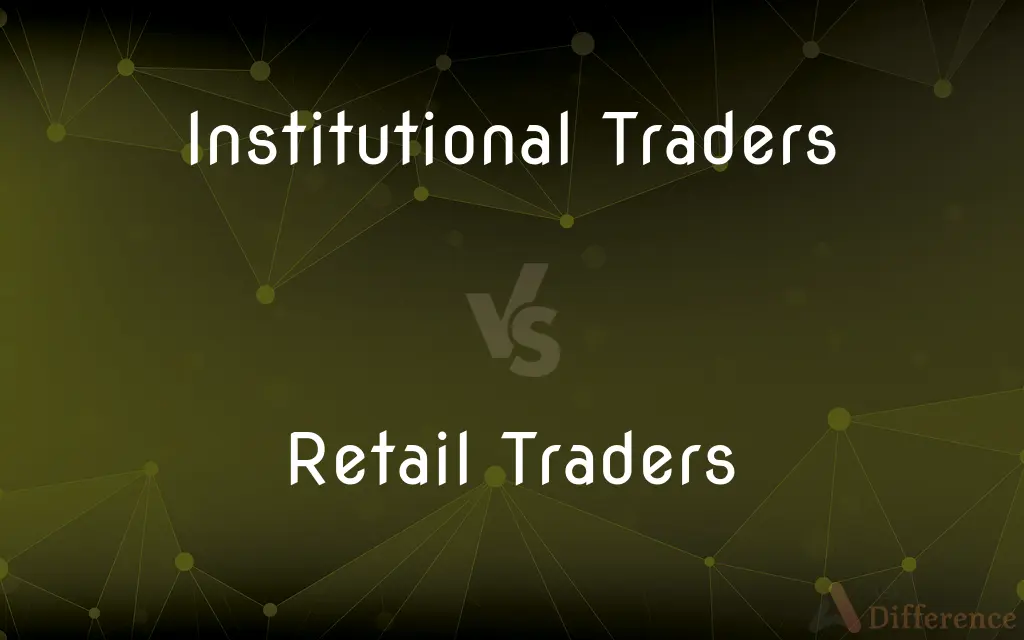Institutional Traders vs. Retail Traders — What's the Difference?
By Tayyaba Rehman — Published on January 7, 2024
Institutional Traders are entities like banks, funds, and corporations that trade large volumes of securities, while Retail Traders are individual investors trading smaller amounts, usually for personal accounts.

Difference Between Institutional Traders and Retail Traders
Table of Contents
ADVERTISEMENT
Key Differences
Institutional Traders: Trade with large amounts of capital, often influencing market prices with their trades. Retail Traders: Typically trade with smaller capital, having less impact on market prices.
Institutional Traders: Have significant market influence and access to sophisticated trading tools and information. Retail Traders: Have limited market influence and access to more basic trading tools.
Institutional Traders: Focus on long-term investments, often with specific goals like fund management or corporate investments. Retail Traders: Generally aim for personal wealth accumulation, often with shorter-term investment strategies.
Institutional Traders: Subject to stricter regulations and higher compliance standards. Retail Traders: Face fewer regulations but also have less protection and leverage.
Institutional Traders: Typically more experienced with deeper market knowledge and analysis capabilities. Retail Traders: Vary in experience and market knowledge, often relying on publicly available information.
ADVERTISEMENT
Comparison Chart
Trading Volume
Large
Small
Market Influence
High
Limited
Objectives
Long-term investment, fund management
Personal wealth, shorter-term investments
Regulations
Stricter regulations, high compliance
Fewer regulations, less protection
Experience
Professional, experienced
Varying levels of experience
Compare with Definitions
Institutional Traders
Traders representing financial institutions or large corporations.
Institutional traders from the hedge fund executed a major trade in the stock market.
Retail Traders
Individual investors trading securities for personal accounts.
Retail traders often use online platforms for their stock transactions.
Institutional Traders
Subject to institutional trading policies and regulatory oversight.
The institutional traders had to comply with new financial regulations.
Retail Traders
Varies widely in trading experience and knowledge.
Many new retail traders entered the market during the recent bull run.
Institutional Traders
Focus on managing large investment portfolios.
Institutional traders often determine the asset allocation for pension funds.
Retail Traders
Trades with comparatively smaller capital.
As a retail trader, she invested in a diversified portfolio of stocks.
Institutional Traders
Engage in high-volume trading with significant market impact.
The institutional traders' decisions can influence stock prices.
Retail Traders
Aims for personal wealth growth, often employing short-term strategies.
The retail trader executed day trades to capitalize on market volatility.
Institutional Traders
Access to advanced trading tools and proprietary research.
Institutional traders used sophisticated algorithms for their trading strategies.
Retail Traders
Limited market influence and access to basic trading resources.
Retail traders rely on public financial news for their investment decisions.
Common Curiosities
What advantages do institutional traders have over retail traders?
Institutional traders have more capital, better tools, advanced information, and greater market access.
Who typically has more influence in the stock market, institutional or retail traders?
Institutional traders generally have more influence due to their large trading volumes.
Can retail traders access the same financial products as institutional traders?
While there is some overlap, certain financial products and advanced trading platforms are exclusive to institutional traders.
How do institutional traders impact market liquidity?
Their large trades can significantly impact market liquidity, both positively and negatively.
Do retail traders have any advantages over institutional traders?
Retail traders can be more agile, making quick decisions without the bureaucracy that institutional traders might face.
What types of securities do institutional traders commonly trade?
Institutional traders often deal in a wide range of securities, including stocks, bonds, derivatives, and foreign exchange.
Can retail traders compete with institutional traders?
While retail traders can be successful, competing directly with institutional traders is challenging due to differences in capital and resources.
Are retail traders more prone to market risks than institutional traders?
Yes, often due to less diversification and fewer risk management tools.
What role do institutional traders play in market stability?
Institutional traders can both contribute to and mitigate market volatility through their large-volume trades.
Do retail traders have a significant impact on stock prices?
Generally, retail traders have a limited impact on stock prices compared to institutional traders, except in aggregate or in specific market scenarios.
What strategies do institutional traders use that are different from retail traders?
Institutional traders often use sophisticated strategies like algorithmic trading, arbitrage, and long-term portfolio management.
Can retail traders participate in institutional trading platforms?
Generally, no. Institutional platforms are designed for entities with a high level of trading volume and capital.
How do regulatory differences affect institutional and retail traders?
Institutional traders face stricter compliance and regulatory standards, impacting their trading strategies and operational procedures.
How has technology impacted retail trading in recent years?
Technology has made trading more accessible to retail traders, providing them with tools and resources that were previously available only to institutional traders.
Share Your Discovery

Previous Comparison
Bootstrap vs. CSS
Next Comparison
Chordates vs. Non-ChordatesAuthor Spotlight
Written by
Tayyaba RehmanTayyaba Rehman is a distinguished writer, currently serving as a primary contributor to askdifference.com. As a researcher in semantics and etymology, Tayyaba's passion for the complexity of languages and their distinctions has found a perfect home on the platform. Tayyaba delves into the intricacies of language, distinguishing between commonly confused words and phrases, thereby providing clarity for readers worldwide.
















































